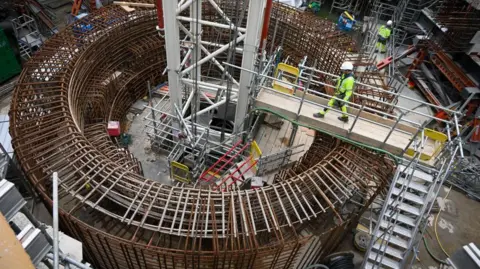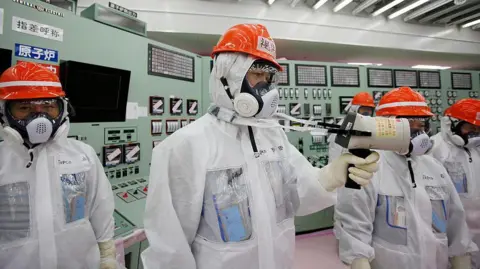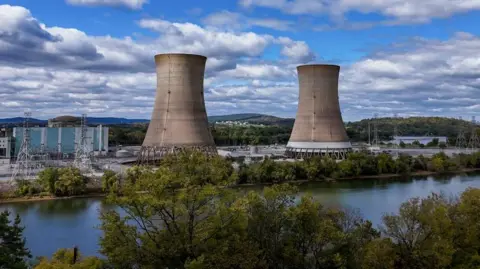[ad_1]
 Getty Photos
Getty PhotosA decade in the past, it appeared as if the worldwide nuclear business was in an irreversible decline.
Considerations over security, value, and what to do with radioactive waste had sapped enthusiasm for a know-how as soon as seen as a revolutionary supply of ample low cost power.
But now there’s widespread discuss of a revival, fuelled by tech giants Microsoft, Google and Amazon all asserting investments within the sector, in addition to the rising pressures on rich nations to curb their carbon emissions.
However how actual is the comeback?
When industrial nuclear energy was first developed within the Fifties and Nineteen Sixties, governments had been seduced by its seemingly limitless potential.
Nuclear reactors might harness and management the identical superior forces launched by atomic bombs – to supply electrical energy for hundreds of thousands of houses. With a single kilogram of uranium yielding some 20,000 times as much energy as a kilogram of coal, it appeared like the long run.
However the know-how additionally impressed public worry. And that worry gave the impression to be justified by the Chernobyl catastrophe, which unfold radioactive contamination throughout Europe in early 1986.
It fuelled widespread public and political opposition – and slowed the expansion of the business.
One other accident, on the Fukushima Daichi plant in Japan in 2011, re-energised considerations about nuclear security. Japan itself shut down all of its reactors within the quick aftermath, and solely 12 have since restarted.
Germany determined to part out nuclear energy altogether. Different nations scaled again plans to spend money on new energy vegetation, or prolong the lives of ageing services.
In line with the Worldwide Atomic Vitality Company, this led to the loss of 48GW of electric power generation globally between 2011 and 2020.
 Getty Photos
Getty PhotosHowever nuclear growth didn’t cease. In China, for instance, there have been 13 nuclear reactors in 2011. There at the moment are 55, with one other 23 beneath development.
For Beijing, scrambling to satisfy quickly rising electrical energy demand, nuclear had, and nonetheless has, an important position to play.
Now curiosity within the sector appears to be rising elsewhere as soon as once more. That is partly as a result of developed nations are looking for methods to satisfy power demand, whereas striving to satisfy emissions discount targets beneath the Paris Settlement.
With 2024 projected to be the warmest 12 months on document, the stress to chop carbon emissions is mounting. A renewed concentrate on power safety, within the wake of Russia’s invasion of Ukraine, has additionally been an element.
South Korea, for instance, just lately scrapped plans to part out its massive fleet of nuclear energy stations over the subsequent 4 many years – and can construct extra as an alternative.
And France has reversed plans to scale back its personal reliance on nuclear power, which supplies 70% of its electrical energy. As an alternative, it desires to construct as much as eight new reactors.
As well as, final week the US authorities reaffirmed on the United Nations Local weather Change Convention, or Cop29, held in Azerbaijan, that it intends to triple nuclear power generation by 2050.
The White Home had originally pledged to do that on the aspect traces of final 12 months’s convention, Cop28. A complete of 31 countries have now agreed to attempt to triple their use of nuclear energy by 2050, together with the UK, France and Japan.
Additionally at Cop29, which ends on Friday, 22 November, the US and UK introduced that they would collaborate to hurry up the event of latest nuclear energy know-how.
This got here after it was agreed within the ultimate assertion or “stocktake” of final 12 months’s Cop28 that nuclear energy must be one of many zero or low emission applied sciences to be “accelerated” to assist fight local weather change.
However starvation for clear energy is not only coming from governments. Expertise giants are striving to develop increasingly functions that use synthetic intelligence.
But AI depends on knowledge – and knowledge centres want fixed, dependable electrical energy. According to Barclays Research, knowledge centres account for 3.5% of electrical energy consumption within the US right now, however that determine might rise to greater than 9% by the tip of the last decade.
In September, Microsoft signed a 20-year deal to purchase energy from Constellation Vitality, which can result in the reopening of the notorious Three Mile Island energy station in Pennsylvania – the positioning of the worst nuclear accident in US historical past, the place a reactor suffered a partial meltdown in 1979.
Regardless of its tainted public picture, one other reactor on the plant continued to generate electrical energy till 2019. Constellation’s chief government Joe Dominguez described the deal to reopen it as a “highly effective image of the rebirth of nuclear energy as a clear and dependable power useful resource”.
Different tech giants have taken a distinct strategy. Google plans to buy energy produced from a handful of so-called Small Modular Reactors or SMRs – a nascent know-how supposed to make nuclear power simpler and cheaper to deploy. Amazon can be supporting SMR growth and development.
SMRs themselves are being promoted, partly, as an answer to one of many greatest drawbacks going through nuclear energy right now. In western nations, new energy stations must be constructed to exacting fashionable security requirements. This, cobined with their sheer scale, makes them prohibitively costly and sophisticated to construct.
Hinkley Level C is an effective instance. Britain’s first new nuclear energy station because the mid-Nineties is being constructed on a stretch of distant shoreline in southwest England.
It’s meant to be the primary of a batch of latest vegetation to interchange the nation’s ageing reactor fleet. However the challenge is working some 5 years not on time and can value up to £9bn ($11.5bn) more than planned.
It isn’t an remoted case. The US’s latest reactors at Plant Vogtle in Georgia opened seven years late, and value greater than $35bn – properly over double their authentic finances.
SMRs are designed to resolve this drawback. They are going to be smaller than conventional reactors, utilizing standardised components that may be assembled rapidly, at websites near the place the ability is required.
However whereas there are some 80 totally different designs beneath growth globally, in line with the Worldwide Atomic Vitality Company, the idea has but to be confirmed commercially.
 Getty Photos
Getty PhotosOpinions about nuclear energy stay extremely polarised. Supporters declare the know-how is indispensable if local weather targets are to be reached. Amongst them is Rod Adams, whose Nucleation Capital fund promotes funding in nuclear know-how.
“Nuclear fission has a seven-decade historical past exhibiting it is among the most secure energy sources accessible,” he explains.
“It’s a sturdy, dependable supply of energy with low ongoing prices already, however capital prices have been too excessive in Western nations.”
Opponents although, insist nuclear energy just isn’t the reply.
In line with Professor M.V. Ramana of the College of British Columbia, it’s “a folly to think about nuclear power as clear”. It’s, he says, “one of the costly methods to generate electrical energy. Investing in cheaper low-carbon sources of power will present extra emissions reductions per greenback.”
If present tendencies do herald a brand new nuclear age, one outdated drawback stays. After 70 years of atomic energy, there’s nonetheless disagreement over what to do with the gathered radioactive waste – a few of which can stay hazardous for tons of of hundreds of years.
The reply being pursued by many governments is geological disposal – burying the waste in sealed tunnels deep underground. However just one nation, Finland, has really constructed such a facility, whereas environmentalists and anti-nuclear campaigners argue that dumping waste out of sight and out of thoughts is just too dangerous.
Fixing that conundrum could also be a key think about dictating whether or not there actually might be a brand new age of nuclear energy.

[ad_2]
[ad_1]
#nuclear #energy #regaining #power
[ad_2]
, 2024-11-21 00:03:00




